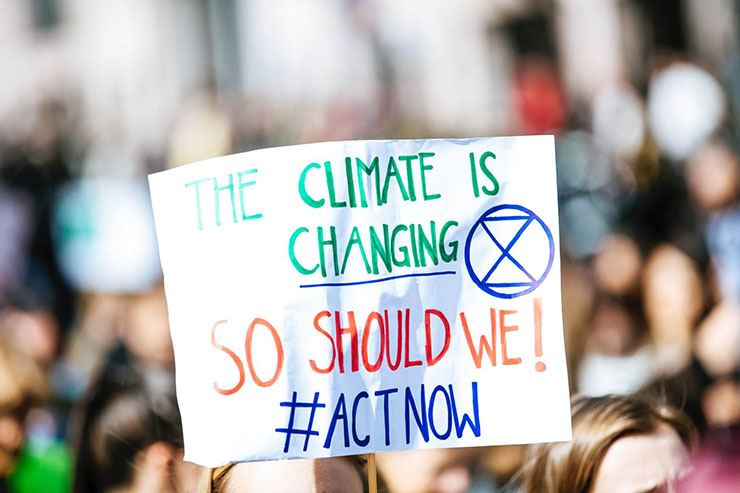Human Resources

Why HR Must Help Tackle the Climate Emergency

18 November 2021 - 3 min read
For decades experts have been warning us that our planet is on the brink of an environmental crisis, and unfortunately, it’s now time to face the fact that we’re running out of time to stop (and reverse) the detrimental impacts of global warming - a tall order when we’re already so behind.
While it’s true that the climate emergency has triggered international action in recent years, the UK government - among others - have been criticised for not acting fast enough in reducing the mass amounts of carbon emissions that are to blame for extreme weather events such as mass heatwaves, wildfires, droughts, and rising sea levels.
These environmental changes have major consequences for human beings and animal species alike, with an estimated 315,000 people losing their lives each year to environmental destruction as well as countless animal species forced out of their natural habitats, with many on the verge of extinction.
To this end, albeit late in the game, the UK parliament has vowed to cut greenhouse gas emissions to almost zero by 2050 in an attempt to halt global warming to 1.5ºC before we reach the point of no return.
While this is all well and good, it’s important to remember that it’s still not enough. This is why HR must help tackle the climate emergency, because as the leaders of the people profession, we can’t ignore that the climate crisis affects everyone - including your employees.

Reduced Emissions & COVID-19
As we all know, the pandemic prompted a series of regulations imposed by governments around the world (i.e. remote working) with the sole purpose of hindering the transmission of the coronavirus.
These changes, however, have inadvertently had positive effects on the environment, proving that human beings have a major role to play in reducing climate change. Due to these effects being well documented in the media, many individuals and businesses are starting to grasp the importance of tackling climate change more effectively.
While it’s impossible to fix climate change in one day, it is possible to start making steps forward right now.

How HR Can Help
If you’re an HR professional looking to do some good and reduce your employees’ carbon footprint in the long term, it’s crucial that you become a climate advocate at work.
A few examples of how HR, in particular, can help with this include:
Implementing ‘Green’ Goals and Policies
While many businesses have already hopped on the growing bandwagon to reduce their carbon footprint, implementing the necessary workplace policies to ‘go green’ (or, in some cases, ‘go greener’) is truly the best way forward.
This means encouraging both business leaders and employees to modify their behaviours at work, such as:
- Making use of reusable coffee cups and utensils to reduce waste.
- Providing recycling bins and encouraging all employees to recycle correctly.
- Reviewing the need for business air travel and using greener transport alternatives or remote meetings where possible.
- Training teams to properly use equipment and technology to minimise energy use (i.e. unplugging or shutting down machines when they’re not in use).
- Carpooling or biking to the office when possible to save on nitrogen dioxide emission, (especially given that motorway vehicles contribute to roughly 35% of emissions in our air supply).
In addition, HR professionals can also:
- Encourage teams to volunteer for eco-friendly initiatives like planting trees, perhaps by offering a paid volunteer day.
- Advocate for using company events as a means to raise money for environmental projects.
- Implement a formal net-zero strategy with buy-in from senior management
- Implement a climate resilience strategy to protect the business from the adverse effects of climate change.
It’s a good idea for HR to work with senior management to build climate-related responsibilities and targets into job descriptions and performance reviews, especially at the management and C-suite level. This will help to ensure that environmental policies are being implemented and encouraged at every level, from the top down.

Introduce Flexible Working
When the pandemic hit, many businesses adopted a flexible working model as a method of ensuring safety for their employees; however, as mentioned before, these changes ended up having a positive effect on the environment.
Not only was there a reduction in greenhouse gas emissions, fossil fuel consumption, and air pollution, but there was also significantly less paper and plastic waste.
It’s important that HR encourages employers to continue providing flexible and hybrid working to reduce the environmental impact of employees traveling to and from work five days per week, even post-pandemic.
Enhancing the Training and Development Experience
Another way HR can help make businesses more eco-friendly is by working with their L&D teams to transform the training and development experience into one that’s more eco-friendly.
It’s important that HR and L&D work together to create a working culture that is environmentally conscious. This means introducing training to make sure employees are aware of environmental policies and goals, including specialist training for those whose roles and processes are directly affected, and keeping employees informed and educated about climate-related policy changes and how they can continue to help.
L&D can also contribute by choosing environmentally friendly training solutions where possible: for example, offering online learning options rather than encouraging learners to travel to a training venue, particularly for those travelling long distances.

Remain Adaptable
While it’s all well and good for HR to encourage a greener lifestyle at work, the environmental crisis is constantly evolving, which means that above all else, HR must still remain adaptable and willing to change policies and goals as necessary in alignment with environmental initiatives.
In doing so, companies will benefit by having their policies demonstrate a direct impact on their business, including the promotion of an environmentally sound business ethic that will attract more conscientious talent, making for better workplace culture.
We’re all capable of making a difference, and the biggest differences always start out with the smallest changes. So, as we continue to face the stark impacts of climate change, we hope it’s clear why it’s so important for HR to help tackle the climate emergency.
We really are all in this together.
Download Your Free CIPD Course Guide
Get information on our CIPD courses
Share this post
Reach your HR potential and enrol on one of our 100% online professional CIPD qualifications. Start today and get your free CIPD course guide.












